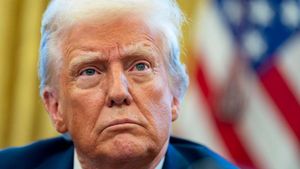Global automotive stocks tumbled on Monday following U.S. President Donald Trump’s imposition of 25% tariffs on imports from Canada, Mexico, and incoming goods from China. The tariffs, which take effect on Tuesday, have raised immediate concerns within the automotive sector and sparked fears of impending trade wars.
Shares of some of the largest global automakers took significant hits during U.S. pre-market trading. General Motors saw its stock fall by 8%, dropping to around $45.40, marking about a 25% decrease since its peak of over $61 last November. Meanwhile, Ford’s shares plunged more than 5%. Tesla also felt the heat, with its stock dropping nearly 4% to $390, exacerbated by disappointing sales numbers reported earlier.
Adding up the numbers, the automotive world is bracing for a tidal wave of changes. Analysts suggest the tariffs could dramatically reshape the industry’s financial outlook, especially considering the heavy reliance on manufacturing operations across North America and the complex supply chains spanning the continent.
Trump’s recent announcement came as part of his administration's broader strategy to address what he describes as the major threats posed by illegal immigration and drug trafficking—especially citing fentanyl—as justifications for the tariffs. Reported by various outlets, Trump noted, "Because of the major threat of illegal aliens and deadly drugs killing our Citizens, including fentanyl," underlining the administration's prioritization of domestic issues.
The auto industry's response has not been flattering. Companies like Volkswagen, BMW, and Stellantis have expressed serious concerns about the financial repercussions these tariffs may exact. Early Monday, Volkswagen announced it was assessing the potential effects, stating, "We are counting on constructive talks between the trading partners to... avoid a trade conflict." BMW struck a similar tone, emphasizing the importance of free trade for economic growth, claiming, "Tariffs, on the other hand, hinder free trade, slow down innovation, and set a negative spiral in motion. They are detrimental to customers," according to spokesperson comments covered by CNBC.
Overseas, the tariffs’ repercussions have been swift. Canadian Prime Minister Justin Trudeau has already pledged retaliatory measures, indicating, "Our response will also be far-reaching and include everyday items such as American beer, wine and bourbon, fruits and fruit juices," responding with levies against approximately $155 billion of U.S. goods. Mexican President Claudia Sheinbaum also announced potential plans to defend Mexico’s interests, underscoring the seriousness of the situation to Mexican trade relations.
The European Union, which Trump has warned might be next on the tariff list, has responded defiantly, with spokespeople reiteratively asserting, "The EU will respond firmly to any tariffs." Economic experts predict tariffs on EU exports could not only raise vehicle costs within the U.S. but would likely lead to significant declines in EU auto exports as well.
This situation arrives at a tumultuous time for European manufacturers, already grappling with significant downturns. Many German automakers, including Volkswagen, Mercedes-Benz, and BMW, have issued profit warnings recently due to global economic weakness and diminished demand, especially from China. The overall market response to Trump’s tariffs reflected this unease, with the Stoxx 600 autos index dipping by 3.7%—the largest loss among all European sectors.
Investors and analysts alike are increasingly worried about the broader economic impact of these new tariffs, which could escalate and affect various sectors beyond automobiles. A rise from any extended trade conflict could lead to increased consumer prices, slower innovation rates, and potential job cuts within the automotive sector.
The ramifications of these tariffs won’t just be felt across the auto industry; they are anticipated to ripple through numerous supply chains and impact economies globally. Currently, the auto industry stands as one of the most interconnected sectors within international commerce, making it particularly vulnerable to such abrupt policy changes.
Moving forward, both the White House and affected companies will likely be under immense pressure to negotiate terms, mitigate retaliatory measures, and avoid plunging the automotive sector—and by extension, the economies reliant on it—into chaos. The stakes are high, and the world will be watching how this situation develops.



